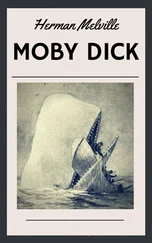Claggart was a man about five and thirty, somewhat spare and tall, yet of no ill figure upon the whole. His hand was too small and shapely to have been accustomed to hard toil. The face was a notable one; the features all except the chin cleanly cut as those on a Greek medallion; yet the chin, beardless as Tecumseh's, had something of strange protuberant heaviness in its make that recalled the prints of the Rev. Dr. Titus Oates, the historic deponent with the clerical drawl in the time of Charles II and the fraud of the alleged Popish Plot. It served Claggart in his office that his eye could cast a tutoring glance. His brow was of the sort phrenologically associated with more than average intellect; silken jet curls partly clustering over it, making a foil to the pallor below, a pallor tinged with a faint shade of amber akin to the hue of time-tinted marbles of old. This complexion, singularly contrasting with the red or deeply bronzed visages of the sailors, and in part the result of his official seclusion from the sunlight, tho' it was not exactly displeasing, nevertheless seemed to hint of something defective or abnormal in the constitution and blood. But his general aspect and manner were so suggestive of an education and career incongruous with his naval function that when not actively engaged in it he looked a man of high quality, social and moral, who for reasons of his own was keeping incog. Nothing was known of his former life. It might be that he was an Englishman; and yet there lurked a bit of accent in his speech suggesting that possibly he was not such by birth, but through naturalization in early childhood. Among certain grizzled sea-gossips of the gun decks and forecastle went a rumor perdue that the Master-at-arms was a chevalier who had volunteered into the King's Navy by way of compounding for some mysterious swindle whereof he had been arraigned at the King's Bench. The fact that nobody could substantiate this report was, of course, nothing against its secret currency. Such a rumor once started on the gun decks in reference to almost anyone below the rank of a commissioned officer would, during the period assigned to this narrative, have seemed not altogether wanting in credibility to the tarry old wiseacres of a man-of-war crew. And indeed a man of Claggart's accomplishments, without prior nautical experience, entering the navy at mature life, as he did, and necessarily allotted at the start to the lowest grade in it; a man, too, who never made allusion to his previous life ashore; these were circumstances which in the dearth of exact knowledge as to his true antecedents opened to the invidious a vague field for unfavorable surmise.
But the sailors' dog-watch gossip concerning him derived a vague plausibility from the fact that now for some period the British Navy could so little afford to be squeamish in the matter of keeping up the muster-rolls, that not only were press-gangs notoriously abroad both afloat and ashore, but there was little or no secret about another matter, namely that the London police were at liberty to capture any able-bodied suspect, any questionable fellow at large and summarily ship him to dockyard or fleet. Furthermore, even among voluntary enlistments there were instances where the motive thereto partook neither of patriotic impulse nor yet of a random desire to experience a bit of sea-life and martial adventure. Insolvent debtors of minor grade, together with the promiscuous lame ducks of morality found in the Navy a convenient and secure refuge. Secure, because once enlisted aboard a King's-ship, they were as much in sanctuary, as the transgressor of the Middle Ages harboring himself under the shadow of the altar. Such sanctioned irregularities, which for obvious reasons the Government would hardly think to parade at the time, and which consequently, and as affecting the least influential class of mankind, have all but dropped into oblivion, lend color to something for the truth whereof I do not vouch, and hence have some scruple in stating; something I remember having seen in print, though the book I can not recall; but the same thing was personally communicated to me now more than forty years ago by an old pensioner in a cocked hat with whom I had a most interesting talk on the terrace at Greenwich, a Baltimore Negro, a Trafalgar man. It was to this effect: In the case of a war-ship short of hands whose speedy sailing was imperative, the deficient quota in lack of any other way of making it good, would be eked out by draughts culled direct from the jails. For reasons previously suggested it would not perhaps be easy at the present day directly to prove or disprove the allegation. But allowed as a verity, how significant would it be of England's straits at the time, confronted by those wars which like a flight of harpies rose shrieking from the din and dust of the fallen Bastille. That era appears measurably clear to us who look back at it, and but read of it. But to the grandfathers of us graybeards, the more thoughtful of them, the genius of it presented an aspect like that of Camouns' Spirit of the Cape, an eclipsing menace mysterious and prodigious. Not America was exempt from apprehension. At the height of Napoleon's unexampled conquests, there were Americans who had fought at Bunker Hill who looked forward to the possibility that the Atlantic might prove no barrier against the ultimate schemes of this French upstart from the revolutionary chaos who seemed in act of fulfilling judgement prefigured in the Apocalypse.
But the less credence was to be given to the gun-deck talk touching Claggart, seeing that no man holding his office in a man-of-war can ever hope to be popular with the crew. Besides, in derogatory comments upon anyone against whom they have a grudge, or for any reason or no reason mislike, sailors are much like landsmen; they are apt to exaggerate or romance it.
About as much was really known to the Indomitable 's tars of the Master-at-arms' career before entering the service as an astronomer knows about a comet's travels prior to its first observable appearance in the sky. The verdict of the sea quid-nuncs has been cited only by way of showing what sort of moral impression the man made upon rude uncultivated natures whose conceptions of human wickedness were necessarily of the narrowest, limited to ideas of vulgar rascality, — a thief among the swinging hammocks during a night-watch, or the man brokers and land-sharks of the sea-ports.
It was no gossip, however, but fact, that though, as before hinted, Claggart upon his entrance into the navy was, as a novice, assigned to the least honourable section of a man-of-war's crew, embracing the drudgery, he did not long remain there.
The superior capacity he immediately evinced, his constitutional sobriety, ingratiating deference to superiors, together with a peculiar ferreting genius manifested on a singular occasion; all this capped by a certain austere patriotism abruptly advanced him to the position of Master-at-arms.
Of this maritime Chief of Police the ship's-corporals, so called, were the immediate subordinates, and compliant ones; and this, as is to be noted in some business departments ashore, almost to a degree inconsistent with entire moral volition. His place put various converging wires of underground influence under the Chief's control, capable when astutely worked thro' his understrappers, of operating to the mysterious discomfort, if nothing worse, of any of the sea-commonalty.
Life in the fore-top well agreed with Billy Budd. There, when not actually engaged on the yards yet higher aloft, the topmen, who as such had been picked out for youth and activity, constituted an aerial club lounging at ease against the smaller stun'sails rolled up into cushions, spinning yarns like the lazy gods, and frequently amused with what was going on in the busy world of the decks below. No wonder then that a young fellow of Billy's disposition was well content in such society. Giving no cause of offence to anybody, he was always alert at a call. So in the merchant service it had been with him. But now such a punctiliousness in duty was shown that his topmates would sometimes good-naturedly laugh at him for it. This heightened alacrity had its cause, namely, the impression made upon him by the first formal gangway-punishment he had ever witnessed, which befell the day following his impressment. It had been incurred by a little fellow, young, a novice, an afterguardsman absent from his assigned post when the ship was being put about; a dereliction resulting in a rather serious hitch to that manoeuvre, one demanding instantaneous promptitude in letting go and making fast. When Billy saw the culprit's naked back under the scourge gridironed with red welts, and worse; when he marked the dire expression on the liberated man's face as with his woolen shirt flung over him by the executioner he rushed forward from the spot to bury himself in the crowd, Billy was horrified. He resolved that never through remissness would he make himself liable to such a visitation or do or omit aught that might merit even verbal reproof. What then was his surprise and concern when ultimately he found himself getting into petty trouble occasionally about such matters as the stowage of his bag or something amiss in his hammock, matters under the police oversight of the ship's-corporals of the lower decks, and which brought down on him a vague threat from one of them.
Читать дальше












